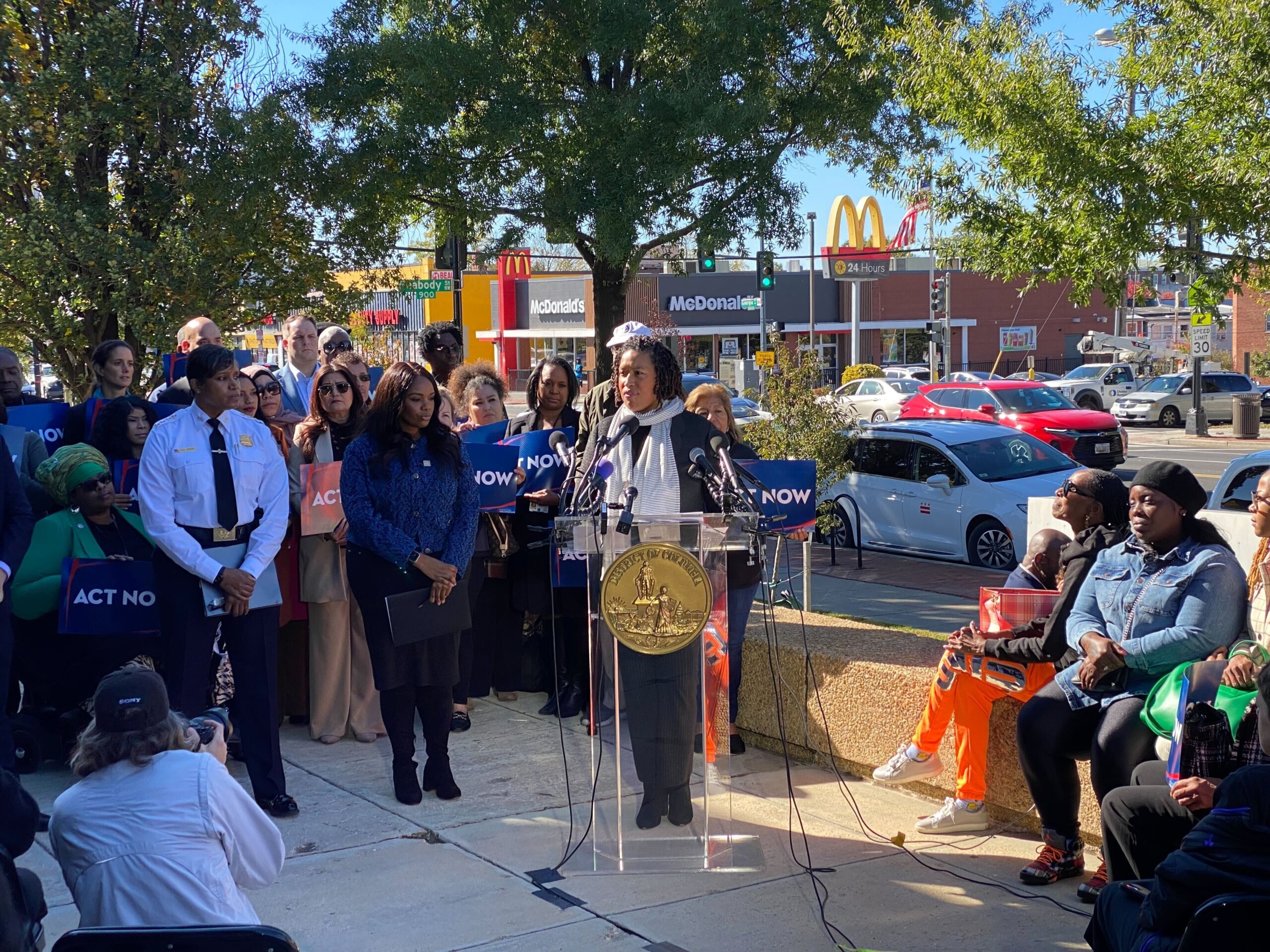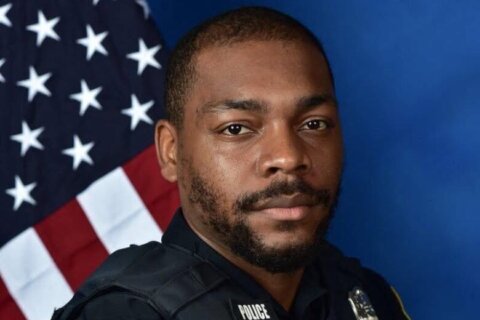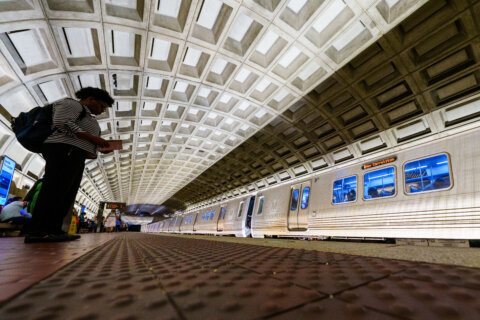
With crime on the rise in staggering numbers in D.C., Mayor Muriel Bowser unveiled new legislation on Monday that she said would give law enforcement additional tools to keep the District safe.
The bill allows D.C. police to temporarily declare “drug-free zones” around the city, creates criminal penalties for “organized retail theft” and reinstates a law that prohibits wearing a mask to commit a crime or threaten others.
It’s called the Addressing Crime Trends Now Act (ACT Now), and Bowser said in a news conference Monday that some of the changes proposed by the new legislation are “just plain common sense. ”
Bowser said the proposed law will deal with some of the “negative consequences” of the Comprehensive Policing and Justice Reform Amendment Act of 2022, which the D.C. Council passed in December 2022 and Congress sought to overturn last spring.
“Some of the changes that were made just don’t match the daily practice of safe and effective policing,” Bowser said, referencing how police make contact with a person, how they use body camera footage to write their reports and whether they can chase a “criminal who’s in front of them.”
Bowser was joined by acting D.C. police Chief Pamela Smith, Deputy Mayor for Public Safety and Justice Lindsey Appiah and D.C. Council members Kenyan McDuffie, Janeese Lewis George and Anita Bonds in announcing the proposed legislation.
Drug-free zones
The proposed law aims to limit loitering by allowing police to temporarily declare a drug-free zone for up to five days.
“People in the community are not fools,” Bowser said. “They know what’s happening on some of these sites” — referring to open-air drug dealing on District streets.
Smith said there are a few areas in the District where they will intentionally focus, but added she did not want to “forecast where we will go” because of plans to keep the community and officers safe.
Organized retail theft
Bowser said that she has also heard from businesses and community members who are sick and tired of establishments being “robbed repeatedly and brazenly.”
“Under the new law, it will be illegal for any person to organize a theft-for-profit scheme by recruiting or directing other individuals to commit organized retail theft,” Bowser said.
Under this provision, it will also be unlawful to wear a mask for the purpose of “committing criminal acts or threatening people or causing fear,” the mayor said, citing recent video that shows masked people getting out of a car with a gun pointed at another person.
Bowser said the mask change won’t apply to people who are wearing them for their health.
Appiah said this gives officers the opportunity to interrupt potential criminal activity.
“This gives MPD the opportunity to even engage. If an officer saw someone approaching, walking up the sidewalk now in July with a ski mask, they have no tool to engage, even if they believe that is based upon the totality of circumstance,” Appiah said.
Chokehold ban
The death of George Floyd in Minneapolis police custody led to sweeping police reform, especially regarding the use of chokeholds, across the country, including in the D.C. area.
Bowser’s new bill aims to roll back some measures.
Smith said that the text in the comprehensive police reform bill approved by the D.C. Council was “overly broad and jeopardizes our public safety.”
She said the current wording of the law often found officers, “due to incidental contact in volatile situations,” in violation of the policy as written.
And while she said the restrictions may have been “well-intended, they have the unintended consequences of potentially escalating the severity of the force that is used.”
“It creates situations where officers are kind of hesitant to go hands-on to apprehend an individual when it is appropriate. It has created circumstances where officers’ credibility has been called into question due to incidental contact,” Smith said.
She added that another provision to the proposed legislation is maintaining transparency but also allowing for privacy when it comes to officer discipline.
Vehicle pursuits
Recent D.C. police reform legislation also limited police officers’ ability to pursue suspects in vehicles.
Smith said that officers need to have the “limited ability to pursue in the most violent cases to ensure that we keep our community safe.”
According to Smith, the threshold for a pursuit to take place is that officers must witness an imminent threat to public safety, after which they can use their discretion.
Body camera policies
The reform bill also barred police officers from reviewing footage from their body cameras before writing initial police reports — which led to some reports that were inaccurate and more easily challenged in court.
“One of the hindrances in that is not being able to articulate or remember, right, what actually occurred. And it’s not necessarily the actual entire incident, it may just be a color of a car,” Smith said, adding that officers being able to review the footage will help in prosecuting cases.
Council members stress unity in making the District safer
Seven council votes are needed for the new legislation to pass, and At-Large Council member Bonds said she does know whether the votes are there, but said, “We probably will.”
At-Large Council member McDuffie, who has not seen the proposal, said he was here to show support for residents.
“I’m here, and I think my colleagues are here, because the violence that we’re seeing right now, the crime is rampant, and it’s unacceptable,” McDuffie said. “This today, for me, was about really showing a sense of solidarity that I do not accept the levels of crime that we’re seeing.”
Lewis George, who represents Ward 4 in the D.C. Council, concurred and stressed working together — with the Council, the mayor’s office, the D.C. attorney general, as well as the federal government.
“I think we are saying today, all of us, that we’re standing together against what is happening in our community, to our children, to our families,” Bonds said.
Bowser is also pushing the D.C. Council to move forward with her “Safer Stronger Amendment Act.” Included in that act is the removal of the requirement that a juvenile must possess a firearm in order for the court to determine whether “secure detention” is appropriate for youth who commit a violent crime.
It also allows the court to consider whether detention is appropriate for juveniles charged with a crime of violence or dangerous crime. This push comes after the two recent homicides of D.C. youth that were in the juvenile justice system under court supervision.
This year, D.C. has seen a 39% increase in violent crime compared to last year, according to District statistics.
There have been 224 homicides this year as of Oct. 20, which is a 34% increase from 2022.
The increase in crime in D.C. was the subject of a hearing on Capitol Hill in mid-October.
Victims of crime in the District spoke before Republican leaders, telling the House Judiciary Subcommittee on Crime and Federal Government Surveillance their stories and their concerns about the increase in crime in the city.









